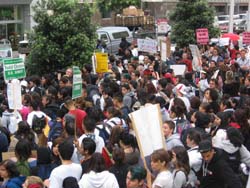More than 1 million immigrants in U.S. strike
More than 1 million mostly Hispanic immigrants and their supporters skipped work and took to the streets, flexing their economic muscle in a U.S.-wide boycott that succeeded in slowing or shutting many farms, factories, markets and restaurants. From Los Angeles to Chicago , Houston to Miami , the "Day Without Immigrants" attracted widespread participation Monday despite divisions among activists over whether a boycott would send the right message to Washington lawmakers considering sweeping immigration reform.

"This country needs us. We are the strong arms that do all the tough jobs," said Donna Maria Mostache, a 43-year-old cook and illegal immigrant who marched in Los Angeles . "We can't be afraid to come out and say who we are." The boycott was organized by immigrant activists angered by federal legislation that would criminalize the nation's estimated 11 million illegal immigrants and fortify the U.S-Mexico border. Its goal was to raise awareness about immigrants' economic power.
Two major rallies in Los Angeles attracted an estimated 400,000, according to the mayor's office. Police in Chicago estimated 400,000 people marched through the downtown business district. Tens of thousands more marched in New York , along with up to 30,000 in Houston , 50,000 in San Jose , California , and 30,000 more across Florida . From New Mexico to Tennessee to Massachusetts , smaller rallies attracted hundreds more.
In all, police departments in more than two dozen U.S. cities contacted by The Associated Press gave crowd estimates that totaled about 1.1 million marchers. The mood was jubilant. Marchers standing shoulder-to-shoulder filmed themselves on home video and families sang and chanted and danced in the streets wearing American flags as capes and bandanas. In most cities, those who rallied wore white to signify peace and solidarity.
In Los Angeles , marchers holding U.S. flags aloft sang the national anthem in English as traditional Mexican dancers wove through the crowd. Rallies in Washington , D.C. were scattered, but the White House took note spokesman Scott McClellan said U.S. President George W. Bush disapproved of the boycott.
While most demonstrations were peaceful, a Santa Ana , California , rally of 5,000 in Orange County was marred by people hurling rocks and plastic bottles at officers. Police made several arrests, but it was unclear if they were protesters. In Chicago , illegal immigrants from Ireland and Poland marched alongside Hispanic as office workers on lunch breaks clapped. In Phoenix , protesters formed a human chain in front of Wal-Mart and Home Depot stores. Protesters in Tijuana , Mexico , blocked vehicle traffic heading to San Diego .
Many carried signs in Spanish that translated to "We are America " and "Today we march, tomorrow we vote." Others waved Mexican flags or wore hats and scarves from their native countries. Some chanted " USA " while others shouted slogans, such as "Si se puede!" Spanish for "Yes, it can be done!" Others were more irreverent, wearing T-shirts that read "I'm illegal. So what?" Industries that rely on immigrant workers were clearly affected, though the impact was not uniform.
Tyson Foods Inc., the world's largest meat producer, shuttered about a dozen of its more than 100 plants and saw "higher-than-usual absenteeism" at others. Most of the closures were in states such as Iowa and Nebraska . Goya Foods, which bills itself as the nation's largest Hispanic-owned food chain, suspended delivery everywhere except Florida in what the company called a gesture of solidarity.
None of the 175 seasonal laborers who normally work Mike Collins' 500 acres (200 hectares) of Vidalia onion fields in southeastern Georgia showed up. "We need to be going wide open this time of year to get these onions out of the field," he said. "We've got orders to fill. Losing a day in this part of the season causes a tremendous amount of problems", reports the AP.
N.U.
Subscribe to Pravda.Ru Telegram channel, Facebook, RSS!




